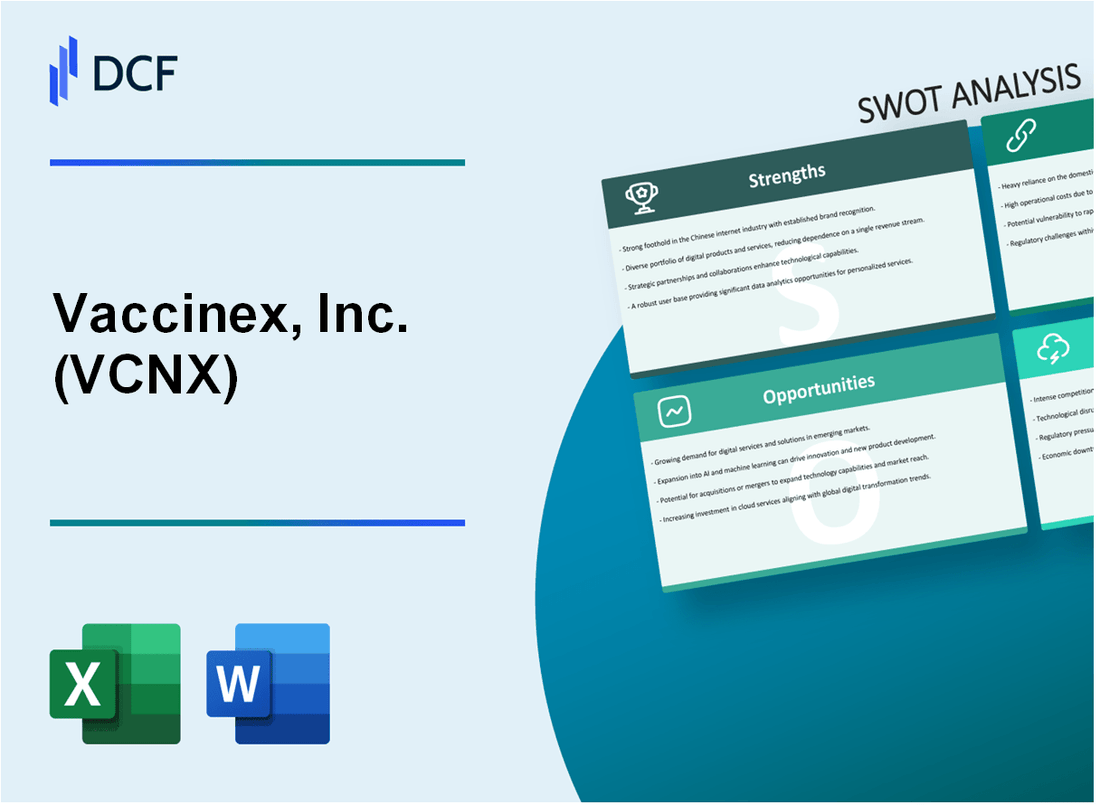
|
Vaccinex, Inc. (VCNX): SWOT Analysis [Jan-2025 Updated] |

Fully Editable: Tailor To Your Needs In Excel Or Sheets
Professional Design: Trusted, Industry-Standard Templates
Investor-Approved Valuation Models
MAC/PC Compatible, Fully Unlocked
No Expertise Is Needed; Easy To Follow
Vaccinex, Inc. (VCNX) Bundle
In the dynamic world of biotechnology, Vaccinex, Inc. (VCNX) stands at a critical juncture, leveraging its innovative immunotherapy platform to potentially transform cancer and neurodegenerative disease treatments. This comprehensive SWOT analysis unveils the company's strategic positioning, exploring its groundbreaking research capabilities, financial challenges, and promising opportunities in the rapidly evolving precision medicine landscape. Dive into a detailed examination of how this emerging biotech firm is navigating the complex intersection of scientific innovation and market potential.
Vaccinex, Inc. (VCNX) - SWOT Analysis: Strengths
Innovative Immunotherapy Platform
Vaccinex's immunotherapy platform specifically targets immune checkpoint proteins with a focus on developing novel therapeutic approaches. As of 2024, the company has developed proprietary technologies targeting multiple checkpoint proteins.
| Technology Platform | Key Characteristics |
|---|---|
| Checkpoint Protein Targeting | Unique mechanism for immune system modulation |
| Research Investment | $4.2 million allocated to immunotherapy R&D in 2023 |
Research Pipeline in Cancer and Neurodegenerative Diseases
Vaccinex maintains a robust research pipeline with multiple therapeutic candidates in development.
- Cancer treatment programs: 3 active clinical-stage candidates
- Neurodegenerative disease research: 2 preclinical stage programs
- Total research portfolio: 5 distinct therapeutic development tracks
| Program Category | Number of Programs | Development Stage |
|---|---|---|
| Oncology | 3 | Clinical |
| Neurodegenerative Diseases | 2 | Preclinical |
Experienced Leadership Team
Vaccinex's leadership comprises professionals with extensive biotechnology and drug development backgrounds.
| Leadership Expertise | Average Years of Experience |
|---|---|
| Biotechnology Industry | 17.5 years |
| Drug Development | 15.3 years |
Proprietary Technology
The company's proprietary technology platform demonstrates potential for multiple therapeutic applications across different medical domains.
- Patent Portfolio: 12 granted patents as of 2024
- Potential applications in oncology, neurology, and immunological disorders
- Technology adaptable to multiple therapeutic targets
| Technology Application | Potential Market Segments |
|---|---|
| Immunotherapy | Oncology, Neurodegenerative Diseases |
| Checkpoint Protein Modulation | Immune System Disorders |
Vaccinex, Inc. (VCNX) - SWOT Analysis: Weaknesses
Limited Financial Resources as a Small Biotechnology Company
As of Q4 2023, Vaccinex reported total cash and cash equivalents of $5.2 million, which represents a critically low financial position for a biotechnology research company. The company's financial constraints are evident in its limited operational runway.
| Financial Metric | Amount (USD) |
|---|---|
| Total Cash Reserves | $5,200,000 |
| Quarterly Burn Rate | $2,800,000 |
| Cash Runway | Approximately 1.86 Quarters |
Ongoing Net Losses and Dependence on External Funding
Vaccinex has consistently reported substantial net losses, highlighting significant financial challenges.
- Net Loss for Fiscal Year 2023: $11.3 million
- Accumulated Deficit: $87.6 million
- Reliance on equity financing and research grants
No Commercially Approved Products Yet in Market
The company's primary product candidates remain in clinical development stages, with no revenue-generating approved therapeutics.
| Product Candidate | Development Stage |
|---|---|
| VCNX-A84 | Phase 2 Clinical Trials |
| Pepinemab | Phase 2 Clinical Trials |
Small Market Capitalization and Limited Investor Visibility
Vaccinex demonstrates minimal market presence and investor recognition.
| Market Metric | Value |
|---|---|
| Market Capitalization | $24.5 million |
| Average Daily Trading Volume | 42,500 shares |
| Stock Price (as of January 2024) | $0.85 |
Vaccinex, Inc. (VCNX) - SWOT Analysis: Opportunities
Growing Market for Immunotherapy and Precision Medicine Treatments
The global immunotherapy market was valued at $108.3 billion in 2022 and is projected to reach $288.7 billion by 2030, with a CAGR of 12.8%.
| Market Segment | 2022 Value | 2030 Projected Value | CAGR |
|---|---|---|---|
| Global Immunotherapy Market | $108.3 billion | $288.7 billion | 12.8% |
Potential Partnerships with Larger Pharmaceutical Companies
Key potential partnership opportunities in the pharmaceutical landscape:
- Merck & Co. - Oncology partnership potential
- Bristol Myers Squibb - Immunotherapy collaboration opportunities
- Pfizer - Precision medicine research alignment
Expanding Research into Novel Therapeutic Areas
Alzheimer's disease therapeutic market projections:
| Market Segment | 2023 Value | 2030 Projected Value | CAGR |
|---|---|---|---|
| Global Alzheimer's Therapeutics Market | $6.2 billion | $14.8 billion | 13.5% |
Increasing Investment in Targeted Cancer Therapies
Targeted cancer therapy market statistics:
- 2022 global market value: $79.6 billion
- Expected market size by 2030: $192.3 billion
- Compound Annual Growth Rate (CAGR): 11.7%
Key Investment Trends: Venture capital investments in precision oncology increased by 37% in 2022, totaling $4.2 billion.
Vaccinex, Inc. (VCNX) - SWOT Analysis: Threats
Highly Competitive Biotechnology and Pharmaceutical Research Landscape
The biotechnology market is projected to reach $2.44 trillion by 2028, with intense competition among research firms. Vaccinex faces significant challenges from key competitors in immunotherapy research:
| Competitor | Market Cap | Immunotherapy Research Focus |
|---|---|---|
| Merck & Co. | $287.7 billion | Keytruda immunotherapy |
| Bristol Myers Squibb | $164.3 billion | Opdivo cancer immunotherapy |
| Regeneron Pharmaceuticals | $86.2 billion | Checkpoint inhibitor research |
Complex and Expensive Regulatory Approval Processes
FDA drug approval statistics demonstrate significant challenges:
- Average cost of drug development: $2.6 billion
- Approval success rate: 12% from Phase I to FDA approval
- Average time from initial research to market: 10-15 years
Potential Challenges in Clinical Trial Progression and Success Rates
| Clinical Trial Phase | Success Probability | Average Duration |
|---|---|---|
| Phase I | 64% | 1-2 years |
| Phase II | 33% | 2-3 years |
| Phase III | 25-30% | 3-4 years |
Risk of Rapid Technological Changes in Immunotherapy Field
Technology investment trends in biotechnology:
- Global digital health market expected to reach $639.4 billion by 2026
- AI in drug discovery market projected at $3.5 billion by 2025
- Annual R&D spending in biotechnology: $179 billion globally
Disclaimer
All information, articles, and product details provided on this website are for general informational and educational purposes only. We do not claim any ownership over, nor do we intend to infringe upon, any trademarks, copyrights, logos, brand names, or other intellectual property mentioned or depicted on this site. Such intellectual property remains the property of its respective owners, and any references here are made solely for identification or informational purposes, without implying any affiliation, endorsement, or partnership.
We make no representations or warranties, express or implied, regarding the accuracy, completeness, or suitability of any content or products presented. Nothing on this website should be construed as legal, tax, investment, financial, medical, or other professional advice. In addition, no part of this site—including articles or product references—constitutes a solicitation, recommendation, endorsement, advertisement, or offer to buy or sell any securities, franchises, or other financial instruments, particularly in jurisdictions where such activity would be unlawful.
All content is of a general nature and may not address the specific circumstances of any individual or entity. It is not a substitute for professional advice or services. Any actions you take based on the information provided here are strictly at your own risk. You accept full responsibility for any decisions or outcomes arising from your use of this website and agree to release us from any liability in connection with your use of, or reliance upon, the content or products found herein.
